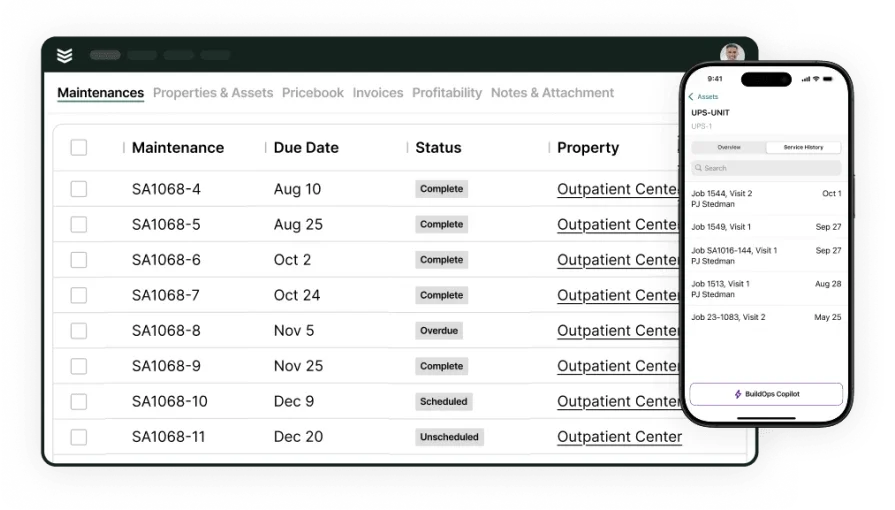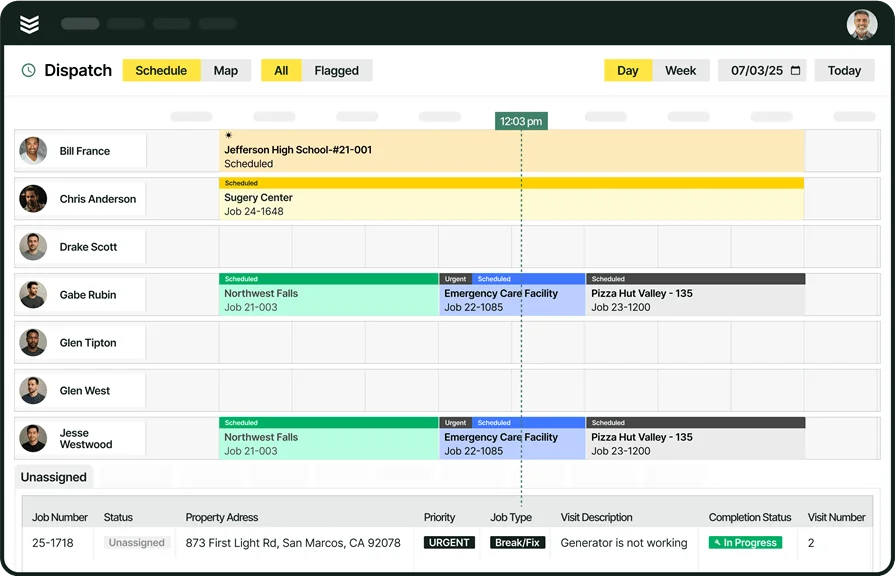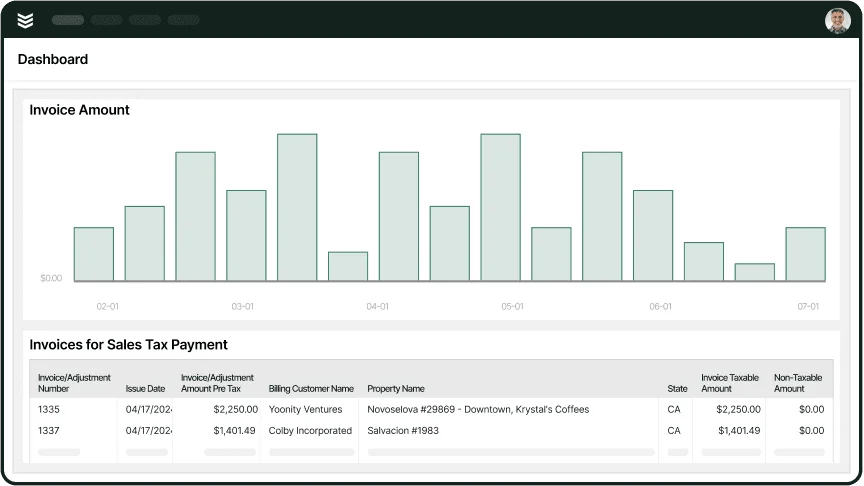Keeping field work on track takes more than just scheduling calls and dispatching techs. When jobs start piling up across locations, crews, and customers, you need something stronger to manage the chaos. That’s where field service job management software comes in. It gives your team a single place to track every task, from estimate to invoice, while keeping your field techs and office staff synced every step of the way.
This type of software is a focused branch of field service management—but unlike general platforms, it zeroes in on job coordination. Think scheduling, work order tracking, technician updates, and real-time job progress—organized and accessible across your whole team. It’s how leading field contractors stay sharp, cut delays, and keep jobs moving without the guesswork.
To help you figure out what makes one tool better than another, we broke the guide down into the sections that matter most:
- The essentials of field service job management software
- Key features to look for in field job management software
- Choosing the best job management software for your team
- Top 15 field job management software solutions
- 5 benefits of using field service job management software
- Other field job management software recommendations by niche & industry
Job management is the backbone of any field service business. Whether you're sending crews out for daily service calls or managing multi-day commercial installs, getting the work assigned, completed, and closed out efficiently is the difference between staying profitable or falling behind. Let's start with the basics—what this software does and why it’s quickly becoming essential for contractors in the field.
The essentials of field service job management software
Before you start comparing different field service management solutions or diving into features, it helps to get clear on what field service job management software actually does—and why it matters. This section breaks down the basics: what it is, what it might cost you, who in your company will get the most out of it, and how it helps managers keep jobs running smoothly. Consider this your foundation before you start building out your shortlist.
What is field service job management software?
Field service job management software is a digital tool that helps contractors plan, assign, and track jobs from start to finish. It handles the nuts and bolts of daily operations—scheduling, dispatching, work order tracking, time logs, customer notes, and job status updates—all in one system.
Instead of juggling spreadsheets, phone calls, and paper work orders, your team can manage everything through one platform that keeps everyone aligned. Office admins get visibility into progress. Technicians know where to go and what needs doing. And field managers can spot delays or issues before they snowball into bigger problems.
At its core, this software exists to cut wasted time, reduce confusion, and keep every job on track—whether you're managing ten service calls a day or overseeing multi-phase installs.
How much does field job management software cost?
Pricing for field job management software can vary a lot depending on the size of your team, the complexity of your work, and the type of features you need. Most platforms charge on a per-user, per-month basis—usually somewhere between $40 and $300. That rate often depends on how many field techs, dispatchers, and office staff will be using the system, as well as how advanced the toolset is.
Some software vendors offer tiered pricing, while others build custom plans based on how your business runs. For example, you might pay more for added features like asset tracking or route optimization, or get volume discounts if you're managing a large team.
Deep Dive
If you're trying to get a handle on real-world costs, check out this detailed breakdown of field service software pricing—including what impacts price, which pricing models are most common, the best field service management software options, and how to spot hidden fees when you're comparing vendors.
Who uses field service job management software?
This kind of software isn’t just for one role—it supports everyone involved in getting jobs scheduled, done, and billed. From field techs out on the road to office admins handling customer records, field service job management software keeps the whole team connected and accountable.
Every role interacts with it differently:
- Technicians use it to see job details, update progress, and close out work in the field
- Dispatchers use it to assign jobs based on availability and skillset
- Managers use it to monitor performance and reallocate resources
- Admins use it to handle invoicing and track service history
- Owners use it to review data, spot bottlenecks, and make smarter decisions
It replaces fragmented tools and manual processes with one system that helps your operation run tighter—so jobs don’t slip through the cracks and communication doesn’t break down between teams.
How field managers use software to improve operations
For field managers, job management software acts like a command center. It gives them the visibility and tools to keep jobs moving without constant phone calls or guesswork. They can see where techs are, what jobs are in progress, what’s falling behind, and what needs attention—without leaving their desk.
More importantly, the software helps them:
- Assign tasks based on technician skill and availability
- Balance workloads to prevent burnout
- Track job progress in real time and make adjustments on the fly
- Monitor inventory and equipment tied to specific jobs
- Keep both customers and office staff informed along the way
Instead of reacting to problems after they happen, managers can get ahead of them—redirecting crews, flagging delays, or identifying patterns that need fixing. Over time, that kind of control doesn’t just make jobs run smoother—it improves how the whole business operates.
Can field job management software work for both residential and commercial contractors?
Yes—but some platforms lean more toward one side than the other. Residential-focused tools often prioritize customer communication and fast quoting, while commercial solutions support asset tracking, multi-property accounts, and more complex job structures. Choosing software that aligns with the type of work you do is key to getting long-term value.
What are some best practices for using job management software?
Getting the most out of field service job management software isn’t just about having the right features—it’s about using them the right way. The best-performing teams follow a few key habits to make sure the system actually helps work get done faster and with fewer mistakes. Here are some simple but effective best practices to keep in mind:
- Train every role on how to use the platform – From dispatchers to field techs, everyone should know how to log updates, access job info, and close out tasks
- Centralize scheduling – Make sure one person or team owns the job board to avoid conflicts and last-minute reshuffles
- Use job tags and filters – Organize jobs by priority, tech skill, or location to make assignment and planning easier
- Keep job notes clean and consistent – Encourage techs to use clear language when logging work so everyone down the line knows what’s been done
- Review your scheduling board daily – Start each day with a job status check-in to catch delays or open tasks
- Close out jobs as soon as they’re done – Don’t wait until the end of the week—updating jobs in real time improves billing and customer follow-up
- Automate what you can – Use notifications, reminders, and recurring job settings to cut back on repetitive admin work
- Pull reports regularly – Make time each week or month to review job trends, tech performance, and common blockers—those insights lead to better decisions
Key features to look for in field job management software
The best field job management software doesn't just handle dispatch—it supports your entire workflow. From scheduling and quoting to invoicing and reporting, it should make your crew’s job easier at every stage. But not every platform delivers on all fronts. This section outlines what to look for when choosing software that can actually keep up with how your business runs day-to-day.
Core capabilities to look for
A solid job management platform should give you control over the entire job lifecycle—without forcing you to stitch together a bunch of different tools. These are the essentials:
- Job scheduling and dispatching – A centralized scheduling system lets you assign techs with a few clicks and react in real time when priorities shift. Combine that with dispatch software and your team stays in sync across every job and crew.
- Quoting and work order creation – Start jobs off right with fast, accurate estimates that convert directly into work orders. Quoting software helps you skip manual entry and speed up job kickoff.
- Time tracking – Knowing how long each job actually takes helps you price better and plan smarter. Built-in time tracking gives techs an easy way to log hours from the field—and gives you the data to back up every project.
- Invoicing – Close out jobs without delay. Integrated invoicing pulls in data from job logs and sends out clean, detailed bills—no follow-ups or re-entry needed.
- Job reporting – You need more than gut feel to improve performance. With reporting, you can see where jobs get held up, which techs are most efficient, and what fixes will move the needle fastest.
- Mobile technician access – Your techs can’t manage jobs if they’re stuck calling the office. The technician mobile app puts everything in their hands—job details, checklists, updates—so nothing slips through the cracks.

Explore our service management suite
Equip your team with the tools they need to book, manage, and invoice projects.
Platform features
Another key consideration when choosing field job management software is how the platform is deployed and accessed by your team. The setup you choose affects everything from daily use to long-term scalability and data security. Here are the most common deployment options to be aware of:
- Desktop — This version of the software is installed on local servers and accessed only through specific company devices. It offers stronger control over security and can function offline, making it less prone to cyber threats. The trade-off is higher setup costs and limited accessibility outside the office.
- Cloud — Cloud-based field service job management software solutions are hosted on external servers and accessed via the internet. They’re easy to set up, accessible from almost any device, and ideal for teams working across multiple locations. The downside is that they rely on a stable internet connection and require you to trust a third party to handle data storage and security.
- Mobile — Most modern job management tools come with a mobile app version. This allows techs in the field to receive assignments, update job statuses, and communicate with the office without needing to return to HQ. It also supports syncing with the main system, so updates are shared instantly across the team.
Work & business type features
Different job types call for different workflows. Whether you're managing large commercial projects, recurring service calls, or fast-turnaround repairs, your software should be flexible enough to handle it all. These features help you tailor job management to the kind of work your crews do every day.
- Recurring work – Automate scheduled service calls and maintenance visits using built-in service agreements
- Phased job handling – Break complex projects into multiple visits or tasks without losing track of the overall progress
- Work order visibility – Assign, update, and track job details across roles with real-time updates and shared task access
- Customer site tracking – Use CRM software to manage jobs across multiple properties for the same client
- Job templates – Save time by standardizing the scope, tasks, and notes for common service types
- Sales pipeline connection – Convert new opportunities into active jobs without duplication using pipeline tools
Asset management features
Keeping track of the tools, vehicles, and parts your crews rely on isn’t optional—it’s essential for job execution. When equipment goes missing or a truck breaks down, your schedule takes the hit. That’s why strong job management software should include built-in asset tracking capabilities that help you stay ahead of issues before they cost you time or money.
- Inventory management – Track tools, materials, and replacement parts across warehouses, trucks, and job sites. Get alerts when stock runs low or items are missing so you can reorder before it slows a job down. Learn all there is to know about field inventory management software.
- Fleet tracking – Know where your vehicles are, how they’re being used, and whether maintenance is due. Helps prevent breakdowns and reduces downtime between jobs.
- GPS and geofencing – See when techs arrive or leave a job site and verify task completion with location-based check-ins.
- Condition and lifecycle tracking – Monitor equipment wear and schedule proactive replacements or service based on usage data.
Deep Dive
If you want to see how different types of software handle asset-heavy workflows, check out our breakdown of types of field service management software.
Choosing the best job management software for your team
Selecting the right job management software hinges on its alignment with your field operations. The software's features, from dispatch to invoicing, should effectively support real-world tasks. Consider these critical aspects to determine the best platform for your business.
- Industry focus — Is the software tailored to commercial field service work like HVAC, electrical, plumbing, or fire safety? Tools built for general use might not support the workflows your team depends on.
- Job structure support — Can it handle the kind of work you take on—one-off service calls, recurring jobs, or multi-visit installs? Look for features that reflect the actual scope and cadence of your projects.
- Scalability — As your workload grows, can the platform handle more jobs, techs, and dispatchers without breaking down? You’ll want software that scales up without adding chaos.
- Pricing model — How is it billed—by user, by feature set, or by volume of jobs? Are you paying for features you don’t need, or is it flexible enough to grow with your business?
- Core features — Does it cover what you need to assign, track, and close out jobs fast—quoting, scheduling, mobile access, time logs, and invoicing? Skip the fluff. Focus on tools that support the real work.
- Integrations — Will it connect with the systems you already use—like payroll, accounting, or CRM? That way you’re not duplicating data or creating more admin work.
- Deployment type — Is it cloud-based for access anywhere, or does your team need an on-premise solution? Also, make sure there's mobile access for techs handling updates from the field.
- Ease of use — Is it something your team can pick up quickly without needing weeks of training? If it’s too complex, it won’t get used—and that kills adoption fast.
There’s a lot to consider, but narrowing in on these essentials will save you headaches later. Up next, we’ll walk through top job management software solutions worth a serious look.
Top 15 field job management software solutions
We’ve narrowed the list to software tools that are purpose-built for managing jobs in the field—quoting, assigning, tracking, and closing them out across crews and job sites. Instead of overwhelming you with every platform out there, we focused on the ones that actually help manage real work at scale. That means we’ve left out tools aimed mostly at specialty contractors and designers, since those don’t prioritize the core job management workflows most commercial contractors depend on.
If you’re looking for solutions tailored to design-build firms, architects, or specialty trades, check out our curated list of field service management platforms instead.
Best field job management software for commercial contractors
Commercial contractors work on offices, facilities, and multi-site business properties—jobs that involve coordination across large teams and complex schedules. These types of companies need more than just basic scheduling: they need full visibility into the job lifecycle, strong CRM features, and tools that keep everyone connected from dispatch to invoicing.
1. BuildOps
BuildOps is purpose-built for commercial contractors who manage complex jobs across multiple properties and teams. Its platform supports the full lifecycle of a job—from quoting to scheduling to invoicing—while keeping dispatchers, field techs, and office staff fully in sync. Features like an asset-based CRM, real-time scheduling board, and AI-powered mobile app are tailored to high-volume operations that can’t afford miscommunication or manual tracking.
Industry Specializations: HVAC, refrigeration, electrical, plumbing, fire safety
How Pricing Works: Per-month cost based on the number of users; set up a demo for a personalized quote
What Sets It Apart: Asset management hierarchies that let you organize and search for different properties owned by the same customer
Key Features:
- Advanced customer and property search functions that don’t require exact matching
- Mobile app with AI-powered spelling/grammar checker, translation, and autofill for fast notetaking and invoice generation
- Real-time updates to the scheduling board take confusion and conflicts out of dispatching

Take a closer look at BuildOps
Gain total control over job management, tech coordination, and customer management.
2. ServiceTrade
Image Source: ServiceTrade
ServiceTrade focuses on helping commercial contractors manage jobs that require long-term service agreements and recurring visits—especially in fire safety and HVAC. It supports work order tracking, scheduling, and customer communication, all while offering a digital-first platform to streamline field operations. However, its reporting features are less robust than some competitors, and project management capabilities are still maturing.
Industry Specializations: Fire safety, HVAC, electrical, refrigeration, kitchen exhaust cleaning
How Pricing Works: Contact to request pricing; appears to be based on number of techs
What Sets It Apart: Digital customer communication and self-serve help options make it easy for customers to track job progress
Key Features:
- One of the few job management platforms built specifically for commercial contractors
- Tools for recurring job scheduling and tracking preventive maintenance
- Strong inventory management for parts and material tracking
3. FieldPulse
Image Source: FieldPulse
FieldPulse is an affordable platform that combines quoting, scheduling, dispatching, and invoicing in one place. It’s especially appealing for smaller teams or new contractors who want a full set of job management tools without a steep learning curve. That said, FieldPulse may not offer the depth or scalability needed for large-scale commercial operations with complex workflows.
Industry Specializations: HVAC, plumbing, electrical, appliance repair, property maintenance, cleaning
How Pricing Works: Flat monthly rate; tiered by team size and features
What Sets It Apart: Mobile-first design with features tailored for small-to-mid-sized field service teams
Key Features:
- Intuitive mobile interface for assigning and tracking jobs in real time
- Built-in quoting and invoicing tools for fast job closeout
- Customer communication and scheduling tools in one dashboard
Compare FieldPulse and BuildOps side by side right here.
4. Service Fusion
Image Source: Service Fusion
Service Fusion offers an affordable, cloud-based platform that combines job scheduling, dispatching, quoting, invoicing, and customer communication. It’s built for contractors who want a straightforward system that supports day-to-day job management and field mobility. While it’s feature-rich for its price, it may not offer the advanced project management or reporting tools needed for larger commercial teams handling complex, multi-stage jobs.
Industry Specializations: HVAC, electrical, plumbing, refrigeration, appliance repair, locksmithing, landscaping, cleaning, painting, security, and home remodeling
How Pricing Works: Tiered subscription plan with flat monthly or annual rate
What Sets It Apart: Each plan includes unlimited users, making it cost-effective for growing teams
Key Features:
- Skill tagging and service zone mapping for faster dispatching
- Integrated mobile app with access to work orders and customer data
- Tools for estimates, invoicing, service agreements, and payment processing
5. FieldEdge
Image Source: FieldEdge
FieldEdge is a well-known field service platform with strong job management tools for HVAC, plumbing, and electrical contractors. Its strength lies in its real-time integration with QuickBooks, plus built-in tools for scheduling, dispatch, invoicing, and service agreements. However, the interface can feel dated, and some advanced reporting features may require additional setup.
Industry Specializations: HVAC, plumbing, electrical, appliance repair
How Pricing Works: Contact for a quote; pricing varies by company size and features
What Sets It Apart: Real-time sync with QuickBooks for seamless accounting and job cost tracking
Key Features:
- Real-time job scheduling and dispatch dashboard
- Service agreement management for recurring work
- Integrated invoicing and customer payment options
Best field job management software for residential contractors
Residential contractors deal with a high volume of jobs, tight turnaround times, and constant communication with homeowners. The best platforms for this space are built to help smaller teams move fast—without losing track of job status, customer info, or billing. These tools focus on speed, usability, and keeping everything organized across repeat calls and daily service runs.
6. Jobber
Image Source: Jobber
Jobber is designed for home service contractors who need to stay on top of a packed schedule. It supports quoting, dispatching, time tracking, and invoicing, all in a clean, easy-to-use interface. Jobber shines in residential work with repeat customers and routine service calls. However, it lacks deeper customization and project management tools that larger commercial teams might need.
Industry Specializations: Landscaping, HVAC, plumbing, cleaning, tree care, residential general contracting, pest control
How Pricing Works: Monthly or annual per-user pricing with three plan tiers
What Sets It Apart: Clean interface and streamlined features that support fast-paced residential job workflows
Key Features:
- Online booking and customer self-serve portal
- Built-in quoting and invoicing with real-time job updates
- Automated client reminders and job follow-ups
7. ServiceTitan
Image Source: ServiceTitan
ServiceTitan is one of the most well-known platforms for residential service businesses. It supports job scheduling, dispatching, quoting, invoicing, and CRM—making it a go-to choice for high-volume home service teams. It also includes AI tools to suggest available time slots and help optimize schedules. However, it lacks robust job hierarchy tools and doesn’t support multi-day jobs or complex commercial workflows as smoothly.
Industry Specializations: HVAC, plumbing, electrical, garage door, chimney sweeping, roofing
How Pricing Works: Custom pricing based on features and company size
What Sets It Apart: AI-assisted scheduling and a strong CRM system built for residential customer management
Key Features:
- Real-time dispatching and tech tracking
- Mobile quoting and invoicing
- Customer reminders and follow-up tools
See how ServiceTitan’s features stack up when compared to BuildOps.
8. Workiz
Image Source: Workiz
Workiz is geared toward residential contractors who want all the basics—job scheduling, dispatching, estimates, payments—plus built-in marketing and lead management tools. It’s a good choice for niche services like locksmithing or junk removal that need help managing both jobs and leads. That said, it’s lighter on customization and advanced job controls, which limits its fit for larger or multi-phase projects.
Industry Specializations: HVAC, electrical, plumbing, locksmithing, appliance repair, cleaning, junk removal, garage doors
How Pricing Works: Tiered subscription with limits on users per plan
What Sets It Apart: Strong lead management alongside job tracking and dispatch
Key Features:
- Automated booking, reminders, and follow-ups
- In-app communication between techs and dispatch
- Payment collection and invoicing from the field
9. Kickserv
Image Source: Kickserv
Kickserv offers an affordable solution with built-in CRM, scheduling, estimates, and payments—designed for small residential service teams. The interface is clean and easy to adopt, and it includes a self-service portal for customers to manage their own appointments and payments. However, the platform can feel limited for teams that need in-depth reporting or heavy customization.
Industry Specializations: HVAC, plumbing, electrical, cleaning, landscaping, property management, home repair
How Pricing Works: Tiered plans with most tiers capping user count
What Sets It Apart: Customer Center portal for scheduling and payments
Key Features:
- Estimates, invoicing, and payments in one dashboard
- Calendar and job board for daily scheduling
- Simple onboarding for smaller teams
10. Housecall Pro
Image Source: Housecall Pro
Housecall Pro combines job scheduling, quoting, CRM, and payments in a clean, mobile-friendly package. It’s well-suited for residential service businesses that need to move quickly from estimate to payment without extra admin work. While it offers great automation and ease of use, it’s less customizable and may not scale easily for larger operations with more complex needs.
Industry Specializations: HVAC, plumbing, electrical, pest control, house cleaning, appliance repair
How Pricing Works: Per-user monthly pricing with three plan levels
What Sets It Apart: Mobile-first design with strong customer communication features
Key Features:
- Drag-and-drop scheduling with SMS notifications
- Online booking and estimate approval
- In-field invoicing and credit card processing
Best field job management software for construction & general contractors
General contractors need tools that help manage not just individual jobs but full project timelines—often with subcontractors, site-specific requirements, and complex task dependencies. The best software in this space supports estimates, scheduling, communication, and job tracking at a higher level.
11. Tradify
Image Source: Tradify
Tradify is a streamlined platform designed for contractors who need quoting, scheduling, time tracking, and invoicing in one place. It works well for managing multiple smaller projects at once and offers handy integrations like Google Calendar. However, higher-tier features such as subcontractor coordination are only available on top plans, which may limit flexibility for growing teams.
Industry Specializations: HVAC, plumbing, electrical, gas, refrigeration, property maintenance
How Pricing Works: Per-user-per-month tiered subscription plans
What Sets It Apart: Simple setup with useful scheduling and quoting tools for general field teams
Key Features:
- Recurring job scheduling from desktop or mobile
- Real-time job status tracking
- Easy quote-to-job conversion
12. Sera
Image Source: Sera
Sera offers a clean, no-frills platform focused on residential and small commercial contractors in HVAC, plumbing, and electrical. It includes strong quoting, job costing, and scheduling tools—with upfront pricing and support included. That said, it lacks deeper project tracking or industry versatility beyond those three verticals.
Industry Specializations: HVAC, plumbing, electrical
How Pricing Works: $399/month for 4 techs; $149/month for each additional tech
What Sets It Apart: Transparent pricing model and white-glove onboarding support
Key Features:
- AI-assisted job scheduling
- Real-time tech tracking and communication
- Built-in payment and warranty tools
13. Joist
Image Source: Joist
Joist focuses on estimating, invoicing, and payment tracking for contractors who want to simplify their job documentation. It’s particularly useful for project-based residential work like remodeling, flooring, or roofing. However, it doesn’t support scheduling or dispatching, so it may need to be paired with another system to fully manage field operations.
Industry Specializations: HVAC, plumbing, electrical, carpentry, masonry, flooring, roofing
How Pricing Works: Tiered subscription with flat monthly or annual rates
What Sets It Apart: Finance-focused platform with customer payment plan options
Key Features:
- Customizable estimate templates
- Integrated invoicing and payments
- QuickBooks syncing and financing tools
14. Field Complete
Image Source: Field Complete
Field Complete offers job scheduling, dispatching, and CRM tools in an affordable, mobile-ready package. It’s especially good for teams that manage many short-cycle jobs across residential or light commercial properties. That said, its reporting and integrations are limited unless you move up to a higher plan.
Industry Specializations: HVAC, plumbing, electrical, painting, appliance repair, pressure washing, roofing
How Pricing Works: Tiered monthly or annual subscription
What Sets It Apart: Easy-to-use mobile app for task management and dispatch
Key Features:
- Split large projects into multiple jobs
- Estimates, invoicing, and payments in one flow
- Offline functionality for field techs
15. Buildertrend
Image Source: Buildertrend
Buildertrend is built for managing long-term residential construction or remodeling projects. It covers client communication, sales tracking, job costing, scheduling, and document management. While it excels in office-to-client collaboration, it lacks in-field dispatching and job-level technician tools.
Industry Specializations: Home builders, home remodelers, general and specialty contractors
How Pricing Works: Custom pricing based on business size and scope
What Sets It Apart: Full-suite construction management tools focused on large residential projects
Key Features:
- Lead and sales tracking to job handoff
- Centralized scheduling, task lists, and docs
- Client portals with real-time project updates

Get the software scoresheet
Compare leading tools at a glance with our easy-to-use scoresheet.
5 benefits of using field service job management software
Field service job management software doesn’t just make things easier—it changes how work flows across your team. From fewer missed appointments to better reporting and faster decisions, the right system helps you take control of the chaos that comes with juggling schedules, techs, customers, and paperwork. Here are five key ways it makes a difference:
1. Smoother job workflows
Software keeps every job step—from quote to closeout—connected in one place. That means no jumping between tools or losing track of where a job stands. When platforms are built to support an end-to-end field service management process workflow, teams can complete work faster and flag delays before they become problems.
2. Real-time job visibility
Job boards, dashboards, and mobile apps all update in real time, so dispatchers and managers know exactly where each job stands. This kind of visibility is especially valuable when using centralized field service dashboards that display live job statuses, tech assignments, and any pending issues—all without digging through emails or spreadsheets.
3. Better scheduling and resource use
Having a digital schedule board means techs are booked based on skill, location, and availability—not guesswork. That reduces downtime, limits travel between jobs, and helps your team hit more appointments per day. A solid field service scheduling tool ensures your crew stays productive and avoids overbooking or routing mistakes.
4. Smarter reporting and job insights
With every job tracked digitally, reporting becomes automatic. You can pull data on job duration, time to invoice, technician performance, and more. Tools built with field service reporting in mind help surface trends that manual logs often miss—letting you make better decisions based on actual job data.
5. Measurable performance and KPIs
Job management platforms make it easier to define and track the metrics that actually matter: first-time fix rates, job completion times, technician utilization, and response time. With accurate data coming straight from the field, tracking field service metrics and KPIs becomes part of the daily workflow—not an afterthought.
Other field job management software recommendations by niche & industry
Every field service business has its own set of challenges—what works for a plumbing company might not be right for a fire safety contractor or a construction crew. That’s why we’ve also created tailored software recommendation lists based on specific trades, roles, business models, and tech requirements. If you’re looking for tools that specialize in your type of work, these guides are a great place to start.
Explore platforms by trade:
Explore platforms by region:
Explore platforms by feature or toolset:
- Dispatching and scheduling
- Technician routing
- CRM capabilities
- Quoting and booking
- Inventory and asset management
- Reporting and inspections
Explore platforms by business type:
- For commercial projects
- For small businesses
- For enterprise-level companies
- For franchises
- Custom-built
- Fire safety
- Refrigeration
Explore platforms by compatibility or deployment:
When your team’s juggling dozens of jobs across multiple sites, the way you manage those jobs becomes the work. Missed info, bad scheduling, and back-and-forth calls aren’t just annoying—they cost time, money, and trust. That’s where field service job management software steps in. It doesn’t just log tasks—it helps you run a tighter, more reliable operation.
Choosing the right platform means finding one that fits your workload, your team, and your industry. For commercial contractors managing complex field work, an all-in-one system like BuildOps helps bring it all together—scheduling, quoting, dispatch, tracking, and invoicing—in one view. But whatever your size or specialty, the tools are out there to make the job less chaotic and a whole lot clearer.

Curious how BuildOps can help?
Handle everything from scheduling to invoicing—in one simple workflow.












